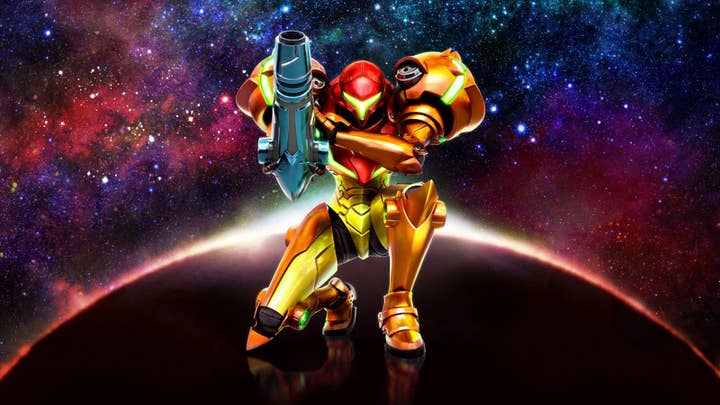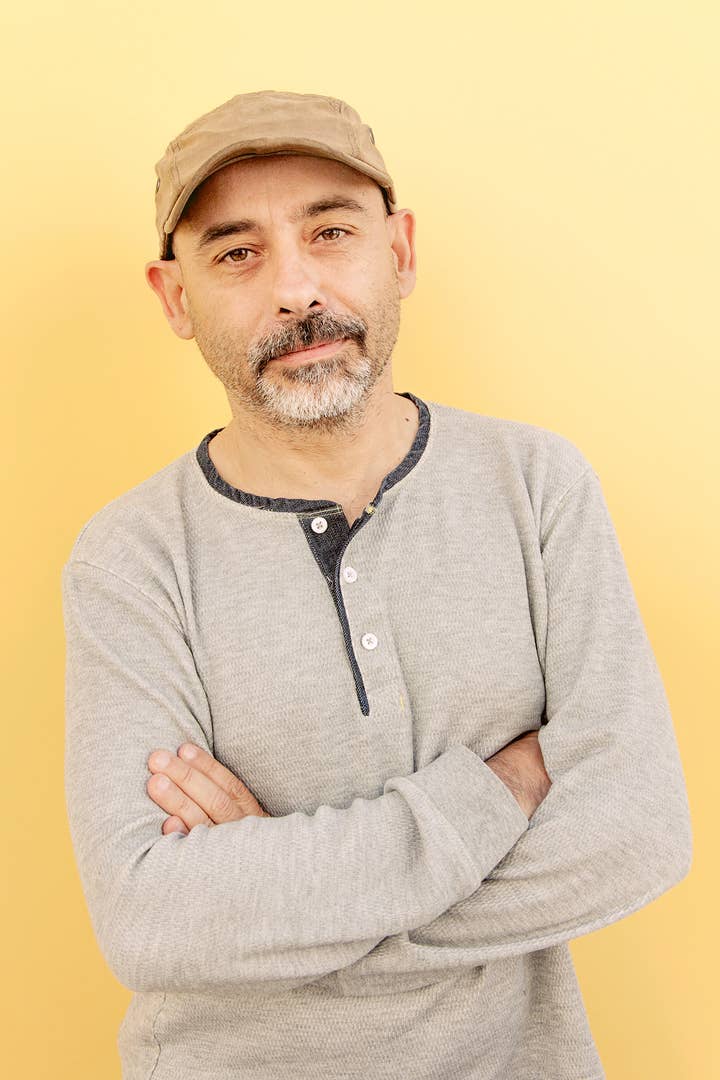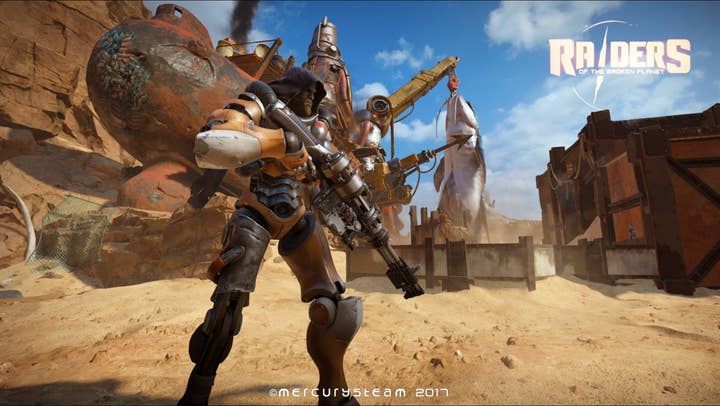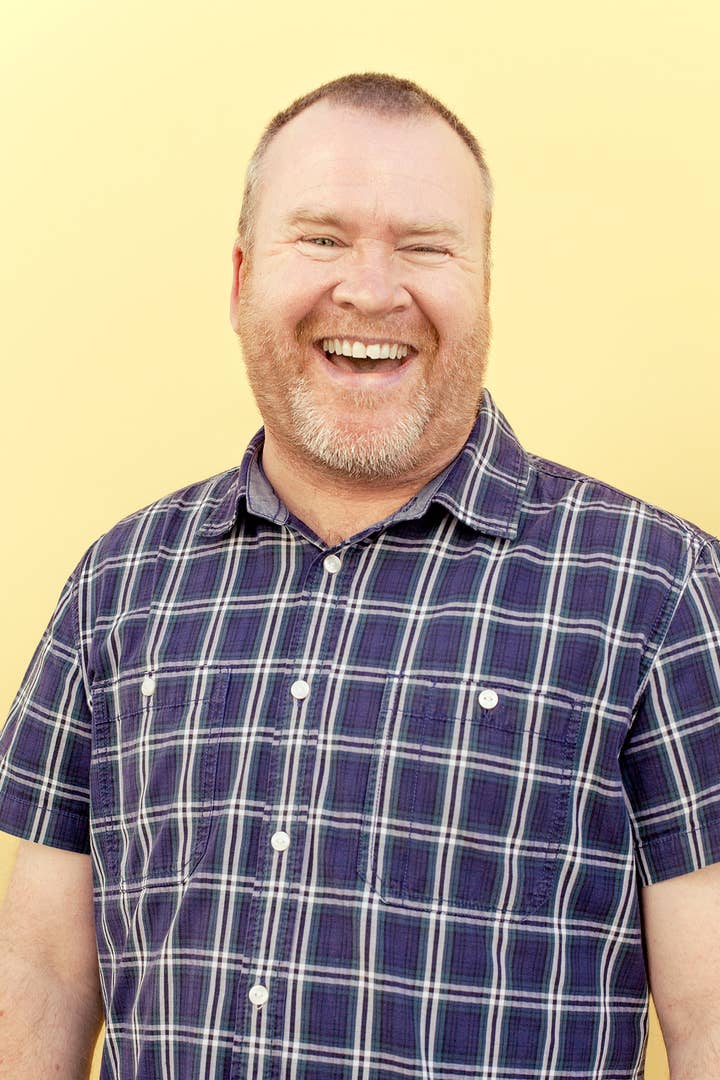The most important seven days in MercurySteam's history
The studio bosses discuss its split personality between working with Nintendo and self-publishing its own AAA IP
Speaking to MercurySteam at Gamescom last month was like talking to two entirely different developers at the same time.
There was the work-for-hire MercurySteam, the team with a deep love for Metroidvania games (the action adventure sub-genre made famous by Konami's Castlevania and Nintendo's Metroid). Having already mastered the 'vania' part with its Castlevania: Lords of Shadow series, the company has just finished work on its first Metroid game - Metroid: Samus Returns for 3DS.
"We are the only studio, ever, to have made a Castlevania and also a Metroid," excitedly boasts studio head Enric Alvarez. "And there is not going to be another one, I can tell you that."
And then there was the new MercurySteam, the studio self-publishing its hugely ambitious wholly owned new IP Raiders of the Broken Planet.
"We are the only studio, ever, to have made both a Castlevania and also a Metroid"
Enric Alvarez, MercurySteam
"It is becoming increasingly difficult in today's market for studios of our size, triple-A studios, to get budgets from publishers, because publishers are so risk averse these days," explains producer Dave Cox. "They have tick boxes for the criteria that they want, because they need to sell a lot of copies. So it's really difficult.
"Yet, there have become more opportunities for companies like MercurySteam to get financing for projects that they want to do by themselves. Raiders of the Broken Planet is the perfect project to take some risks and break the stalemate that is going on in the industry right now, especially as you seem to have a lot of AAA products that get the hype train going, but ultimately disappoint. You rarely get the freedom to do crazy shit, and Raiders has been our opportunity to do that."
Remarkably, both sides of MercurySteam will emerge - over three years since its last project - at almost the exact same time. September 15th marks the arrival of Metroid: Samus Returns, while September 22nd sees the debut of Raiders of the Broken Planet. It will prove to be the most significant seven days in the company's 15-year history.
And with two sides to MercurySteam, comes two interviews.
PART 1: "Nintendo made us a better developer"

The Lords of Shadow series wasn't a complete success for MercurySteam. The first game was a triumph and one of the finest 3D Castlevania titles, but its follow-ups were not quite so warmly received.
Nevertheless, the studio learnt a lot and wanted to put those lessons to use on a Metroid game. Having heard of MercurySteam's ambition to work on the franchise, Metroid co-creator Yoshio Sakamoto visited the studio and they teamed-up on re-creating the 1991 Game Boy game Metroid II: Return of Samus.
It's a rare honour for a European studio to get to play with Nintendo IP (notwithstanding the recent release of Ubisoft's Mario + Rabbids Kingdom Battle), which is something that's not lost on Alvarez.
"It is an incredible achievement for a Spanish studio," he says enthusiastically.
"When you deal with Nintendo at a close distance, you understand why they are who they are"
Enric Alvarez, MercurySteam
"Nintendo is a one-of-a-kind publisher that make one-of-a-kind games. They're special. They are unique. They care about games. I am not exaggerating when I tell you that after two years, 80 or 90% of all the conversations we've had were about stuff that gamers care about. Only the remaining 10 or 20% were about business or usual publishing stuff. That ratio is unique to Nintendo. When you deal with them at a close distance, you understand why they are who they are. I'm not going to lie to you; they are extremely demanding. They require the very best constantly, all the time, and beyond. But it's been a great experience.
"We've worked in the past with other publishers, with Codemasters, with Konami, and they were very different experiences. We had a great experience with Konami, but Nintendo is another thing. There are many, many Nintendo fans who don't like any other games except for their games. Now I fully understand why that is.
"It has been a pleasure, we have learnt a lot. Honestly, they have made us a better developer."
Metroid: Samus Returns was revealed late. It was first shown in June at E3, and is on shelves next week. That's quite a rapid turnaround, but it's been a pleasant experience for MercurySteam.
"People are receiving the game with open arms," Alvarez says. "It is obvious that people wanted this kind of game. I am sure it is going to live up to expectations, because it is the perfect mix between the respect of Metroid's legacy, with new elements. Young people and older hardcore fans will equally embrace this game."
With MercurySteam's own self-published IP - Raiders of the Broken Planet - set to arrive just a week later, this could be seen as one final foray into work-for-hire territory for the developer. But producer Dave Cox says that it's still looking for new partnerships.

"We need to do those work-for-hire [projects] because we still need to pay the bills," he admits. "We are talking to publishers here [at Gamescom] about projects. But at the same time, when you have a success like we had with Castlevania, it makes us reinvest into something else.
"But we're still a work-for-hire studio, fundamentally."
If Metroid: Samus Returns lives up to its billing, it should elevate the firm's work-for-hire appeal, particularly as its previous title didn't achieve the expected level of critical acclaim. However, having worked on Metroidvania games for over seven years, is the studio afraid of being typecast?
"Labelling is always simplistic," Alvarez says slowly. "I understand the need of human beings to label stuff. But... I don't know if that label is negative. It's the first time someone asked me this question. Certainly, we are the only studio that has done both [Castlevania and Metroid]. But we have done other stuff. We've done Raiders of the Broken Planet, which is - for us - as important as Metroid. So I'm fine with it"
PART 2: "The problem with the AAA industry is the lack of risk"

Rare's 2000 classic Perfect Dark was full of ideas, from its clever weapons to its customisable multiplayer. But one of my favourites was an option within the game's story mode, which allowed one player to be the heroine and another to control the enemies. 'Counter-operative' was a clever idea that few developers have tried since. Until now.
"The entire Raiders of the Broken Planet is that counter-operative mode," Alvarez explains.
Cox joins in: "You infiltrate other players' missions. That's the concept. You don't have to kill all the players... they have a mission objective, and you just have to stop them doing it. If they've got to rescue someone, you just need to prevent it happening."
Raiders is a 4 vs 1 challenge. The antagonist must work out what the 4 heroes are trying to achieve and stop them. It's been in beta since the start of the year and arrives on PC and consoles in two weeks.
"One of the happiest days of my life was one of the first days when we went on beta," Alvarez says. "I was scared to death because the concept is special but you don't know anything about it until you put it into the hands of other people. So the first beta we did, three minutes after it started, all the things we hoped to be there were there, the gameplay dynamics, the duration of the missions... everything clicked. Sure, we needed to polish it, but you are always afraid that your concept doesn't click, but this thing worked."
This is MercurySteam's first self-published game, and as a result it's had to increase its headcount.
"If you told me 10 years ago that MercurySteam would reach 140 people, I would have told you you were crazy," Alvarez says. "We are there right now. Raiders is an expensive thing. We want it in a certain way, and the multiplayer aspect requires a lot of infrastructure to make it work. We have it, we're building it, and it's not cheap. This is in MercurySteam's DNA. We have been at this moment a few times in our story, and we always make the decision to go for it.

"We like making games and, one day, if we can't, so be it. But we want to do it our way. That's always been the case, pretty much. Even with Konami we had a high degree of freedom. The only significant difference now is that we are taking the risk ourselves. But we accept this. When we started 15 years ago, we were much younger and we would take reasonable risks. Today, we are older, and many of my partners have families and kids. but we still keep making the same brave decisions. It is the DNA of the studio to go the hardest way - balls to the wall, if you want."
Cox adds: "The problem with the industry right now is that there is a lack of risk, especially in the AAA market. It is healthy to take a few gambles. Sure, some will fail, but some will succeed, and that pushes the whole industry forward."
Alvarez again: "Don't get us wrong. We're not taking risks for the sake of it. We want to sell as many games as possible. But we think we need to offer the audience something different and something special. We just need to find new ways to achieve that. It is our obligation to find a new way."
Ah yes, the new way. MercurySteam is an independent studio that wants to make AAA games, which is a hard thing to pull off without major investment. With Raiders of the Broken Planet, the company is proposing a different business model. The game's prologue will be free, followed immediately with the first campaign for £9.99/$9.99/€9.99. The company will then release regular new campaigns for the same price, hoping that consumers will keep investing.
"This is the first time we are in a position to talk to our players," Alvarez begins. "In the past, we have always had middle men in the form of publishers. You don't always agree, but you have to because it is their business. This time, we are doing it all and we have the luxury of communicating directly with the community. And Raiders is, no doubt about it, a game that needs a community to grow around it. Every multiplayer game needs that, otherwise you are dead.
"To have a happy and healthy community, you need to treat them well. How do you do that? Well first of all, set a fair price. €9.99 for a game of this quality is a good deal. The amount of content that you get is very good. We get the income we need to keep moving forward and we give people a chance to spend little amounts on something that they still need to decide if they like. We are not asking for €60 or €70 for a game that you might not like. We are offering the prologue for free. And it's full fat. It's got all the modes.
"We have had conversations where people have said charge €60 and put it in a box, and we'll talk. That's not of interest to us"
Dave Cox, MercurySteam
"Let's say you buy the first campaign, and you find stuff you like and don't like. You go to the forums, or our social channels, and you let us know. What do you think is going to happen if your suggestion is shared by most players? We are going to implement it one way or another. Because if we don't, you're not going to buy the second campaign."
He continues: "It is possibly one of the very few ways for an independent studio to approach a AAA project. Because AAA means lots of expensive stuff - motion capture, voice over, tonnes of great animations, good design that takes time and a lot of people. We want to make AAA games. We want to make big games and take care of the details. But the only way to achieve this is with a massive budget. This is our solution to putting out a AAA-sized game. Instead of doing it in one go, and asking for €60 or €70, we found that this was a more ethical approach.
Cox says that the firm hasn't ruled out partnering with publishers in the future, even - perhaps - on a boxed release. But "nothing that will compromise the vision", he says. "We have had conversations where people have said, 'Charge €60 and put it in a box, and we'll talk.' That's not of interest to us."
90,000 people have already been playing Raiders in beta and offering feedback, which was why the game has taken a little longer to come out. And the team has vowed to keep developing it. "It is never going to be over," Cox says.
Alvarez concludes: "It's a tough project to work on because you don't see the end. When you are in development, you need to see an end to mentally close something and open something else. But this is the kind of game that is never-ending. We have the first campaign, then the second, then the third... and yeah, they are totally different from each other, but it is the same game. The same problems over and over. But it is amazing to see it now and realise that the idea we had three years ago, which seemed crazy, is real."
